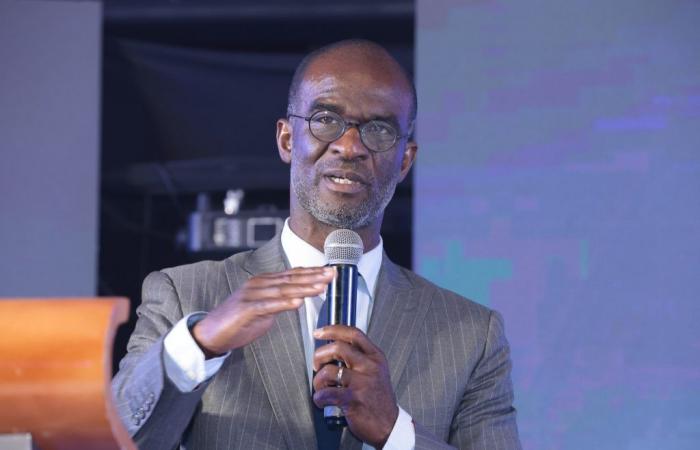On the cover of Financial Afrik’s monthly 111.
Create a pan-African financial rating agency for and by Africans. The idea is making headway in certain African presidential palaces and within certain institutions with a certain dose of populism. The president of the African Development Bank, Akinwumi Adesina, made it his main focus during the institution’s meetings held from May 27 to 31 in Nairobi. Seen by experts on the issue, this idea, as attractive as it may be, ignores local players and the reality of the financial market. Here is what Stanislas Zézé, president of the Blooomfield Investment Corporation rating agency, thinks.
On the sidelines of the latest AfDB meetings, the president of the institution recalled the need for a pan-African rating agency. As an expert in the field, is such a project feasible in the short term?
First of all, it would be important to remind African leaders, certain heads of state and heads of institutions, who are calling for the creation of a pan-African financial rating agency, that there already exist 3 pan-African financial rating agencies. These are Global Crédit Ratings (GCR) created in 1992 in South Africa, followed by Augusto founded in 1999 in Nigeria and Bloomfield Investment Corporation approved in 2007 in Côte d’Ivoire and in the Economic Union zone. West African Monetary Fund (UEMOA).
We therefore have, on the continent, 3 financial rating agencies which together have a total of 64 years of existence and experience. It is therefore quite surprising that these leaders are not aware of this situation and are calling for the creation of a pan-African agency. The African Union is in the process of creating a public financial rating agency which cannot prosper and we have already informed them of this. The agencies Moody’s, S&P and Fitch are not public but rather private.
In reality, no financial rating agency is public because there is a great risk of loss of independence for the agency. I would therefore ask African political and institutional leaders to instead consider strengthening the capacities of existing Pan-African financial rating agencies by creating a special status (Pan-African headquarters agreement) which would strengthen their independence and give them systematic access to all African capital markets. (a unique African approval).
African states believe that Western agencies tend to degrade them and exaggerate the African risk. An admissible argument?
it is important to understand the methodological approach of international agencies so that criticism is constructive. International financial rating agencies assess the capacity and willingness of all rated entities to meet their financial obligations in Dollars (convertible foreign currencies) in the short, medium and long term. In short, the probability of default on foreign currency commitments. This approach does not define the intrinsic credit quality (credibility) of these rated entities given that the majority of them have rent economies (for African countries) or are in rent economies (for companies and communities). territorial). As a result, their foreign currency reserves are low, although it is this element which constitutes the basis of the methodology of these agencies and is the essence of determining the credibility of rated entities.
In conclusion, if you are poor in dollars, you are considered poor and not credible even if your economy is very efficient and generates a lot of wealth in your local currency. Thus, the approach of these agencies is legitimate as long as the rated entity borrows in foreign currencies and, therefore, must repay in that same currency.
This situation highlights two problems: the first is that as long as African countries do not transform their economies so as to reduce their dependence on foreign countries for finished products, their foreign exchange reserves will remain low and their financial ratings will always be in the speculative category (bad rating) regardless of the performance of their economies. Second, African countries will have to borrow in their own currency and be rated in their own currency. This naturally requires that these countries significantly develop their capital markets both in terms of liquidity and good governance. The financial rating made by Bloomfield and other pan-African agencies in local currency is certainly much more appropriate for African economies. This approach in local currencies does not call into question the technical evaluation standards of these entities but corrects the biases of the methodological approach.
The President of the ADB makes the reform of the international financial architecture a necessity for fair access to the capital market. What should we do to lower interest rates on African debts?
I think that for more access to capital for African countries, we must turn to Africa and not to the rest of the world by complaining that others are closing the doors to Africans by all possible mechanisms. The availability of financial resources for African economies appears to me to be a question of strategic organization. Africa has 54 countries, so a huge market. However, the capital market is fragmented into small units with barriers that prevent borrowing between capital markets. these barriers are technical and regulatory because African currencies are not convertible between them. It is imperative to break down all these barriers and create a single African market with a single African currency so as to definitively create certain African independence in terms of financing the economies.
Exactly, how many rating agencies do we have in Africa? Are they able to prevail in the face of competition from international agencies?
Bloomfield is one of the 3 pan-African agencies today, knowing that GCR, which absorbed the former Wara, was bought by Moody’s. So, in reality, there are only two purely African agencies left (Bloomfield and Agusto & Co). Bloomfield today, 17 years after its creation, has a portfolio of more than 130 rated entities annually spread across 20 African countries, 3 European countries and one Asian country. Bloomfield operates in the 5 categories of credit risk which are corporate, financial institutions, financial instruments, sovereigns, public entities (public companies and local authorities). Bloomfield has created and promoted through its Bloomfield Intelligence entity, country risk conferences and sector risk roundtables across Africa. Bloomfield also has to its credit the Bloomfield Private Index which is a tool for evaluating the monthly performance of African private sectors and the Bloomfield Forecast which calculates the economic growth of African countries on a monthly, quarterly and annual basis. Bloomfield is approved in several African markets and its ratings are recognized outside the continent. Today, the objective is to be present in all 54 African countries through the local currency rating of these countries and public and private entities in these countries.






